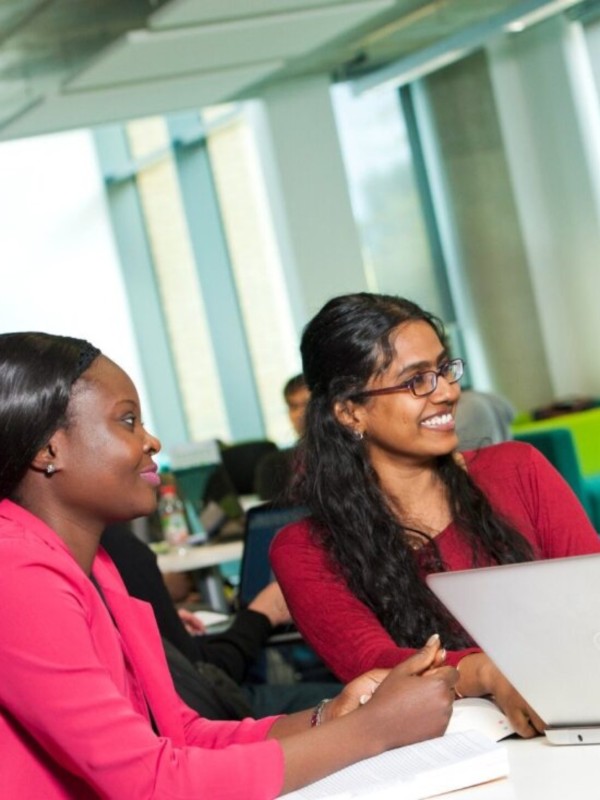
- Management
MSc — 2025 entry Management
Designed with a close eye on the domestic and international graduate job market, our Management MSc allows you to convert from your first degree to management, and build knowledge, skills and insight to succeed in your chosen career.
Why choose
this course?
- You’ll be based in the Surrey Business School and be part of a vibrant community, focused on improving business practice and creating a sustainable and positive change.
- This is a masters course that will excite your competitive nature and feed your ambition.
- You will be exposed to the world of business practice and learn from real examples – and our excellent teaching and industry links will give you an edge with employers. Sourced from prominent organisations, practitioners and scholars, our academic content reflects the latest internationally renowned research conducted at Surrey Business School.
- The programme has been designed flexibly to give you a range of options and a choice of different pathways as shown below. The programme options are:
- Management MSc – Full-time – 12 months
- Management MSc – Full-time with study abroad – 15 months
- Management MSc – Full-time with dual degree from the School of Knowledge Economy and Management (SKEMA), in Lille, France.*
* Please note, only students from the ‘full-time with study abroad 15-month' programme will be considered for the ‘full-time with dual degree from SKEMA’ pathway option.
Statistics
Fantastic graduate prospects
94% of our Surrey Business School postgraduate students go on to employment or further study (Graduate Outcomes 2024, HESA)
Top 75 globally
Surrey is ranked 67th in the THE World University 2023 Business and Economics subject rankings
Top 100 in the world
We’re ranked in the top 100 for Management in the Shanghai Global Subject Rankings 2024
Accreditation

What you will study
This MSc is defined by its focus on developing you as a forward-looking, creative and business-savvy professionals.
The first half of the course will give you a thorough knowledge of management practice and theory. You’ll cover four fascinating core management areas before moving into Semester 2.
In Semester 2, depending on your chosen pathway, you will take a series of practical management modules that will appeal to prospective employers, and learn about innovative developments and trends in business and management. You will take part in projects designed to enable you to demonstrate your academic and professional potential.
Professional recognition
MSc - Association to Advance Collegiate Schools of Business (AACSB)
Accredited by the Association to Advance Collegiate Schools of Business (AACSB).
The structure of our programmes follows clear educational aims that are tailored to each programme. These are all outlined in the programme specifications which include further details such as the learning outcomes:
Modules
Modules listed are indicative, reflecting the information available at the time of publication. Modules are subject to teaching availability, student demand and/or class size caps.
The University operates a credit framework for all taught programmes based on a 15-credit tariff, meaning all modules are comprised of multiples of 15 credits, up to a maximum of 120 credits.
Course options
Year 1
Semester 1
Compulsory
Given that up to a third of our waking lives are spent at work, this module fulfils the imperative to study people in their working environments; we will explore the behaviour of people within their organisational context, as well as salient features of the environment, such as processes and policies, which have a bearing on individual and organisational performance.
View full module detailsThis module will enable students to evaluate the role and nature of supply chain management strategies in meeting the objectives of retail, service and industrial organisations in an ethical and sustainable fashion. Students will become familiar with the specific management approaches to meet the product and service criteria set by customers and these approaches will integrate theory and practice from operations management, ethical decision making and sustainable supply chain management. The module is designed to explore the technical and commercial environment that dictates the supply chain management approach adopted by retailers, service firms and manufacturing businesses in local and international arenas and will also It will also encompass the wider social and geopolitical influences that are increasingly important in the design and management of supply chains which must increasingly deliver value responsively, equitably, and responsibly.
View full module detailsThis module will introduce you to the theoretical foundations of strategy, namely, how to understand market dynamics, opportunities and challenges and develop an appropriate business plan. The module makes the critical connection between the business model and value proposition, investigating the idea of strategic alignment between the two. It provides students with a thorough overview of strategy in the context of organisational structure, culture, relationships, and coordination.
View full module detailsThis module is the foundational building block for the Management MSc Programme, equipping students with the right blend of social and academic skills to succeed during and post-delivery. Based on three pillars of excellence, students will be able to confidently explore the self, communicate effectively across different mediums, and grasp key academic skills to negotiate the Management MSc.
View full module detailsSemester 2
Compulsory
This module explores the use of financial information in strategic decision-making. Appropriate use of financial information is critical to successful decision-making by managers, investors and other stakeholders. In this module, students will explore the 'language' of business by focusing on the dimension that is common to all operations in an organisation, their contribution to adding strategic value. Students will also learn how to analyse the current situation and performance of an organisation and understand, evaluate, select and apply financial based models to support managerial decision-making in the context of strategic corporate aims, including sustainability.
View full module detailsThe module is an advanced, research-led module on sustainability and social innovation. It offers research-led insights into current issues and anticipated trends in sustainability, social innovation, and the changing role of business in society. The module will consider the current theory and critically examine the corporate practice of managing for sustainability, including aspects of corporate governance, corporate social responsibility, innovation and strategic, operational and supply chain solutions for improving sustainability on an international scale. We will examine the social, environmental, economic and business case for sustainability in the global context and reflect on the possible trajectories for the advancement of the sustainability agenda. We will study the emergent trends in organizing for the fulfilment of social needs that are insufficiently (or not at all) addressed by either the private or public sector and examine the case for the social enterprise. We will examine the practice of social entrepreneurship and innovation and reflect on the transferability of the model to more traditional organizations. We will examine how value is created through social innovation and enterprise and look at the associated challenges and opportunities for the future.
View full module detailsThis is an advanced, research-led module on leadership and decision making. The module will draw upon a wide range of disciplines, including social psychology, cognitive psychology, organisational behaviour and managerial cognition to introduce students to the contemporary theories, research and practices or judgement, decision making, and leadership. Leadership is the process through which individuals influence and are influenced by one or more people to accomplish group/organisational goals. It is one of the most important determinants of employee well-being and performance as well as organisational effectiveness. A central part of effective leadership and management is decision making under various organisational and contextual conditions. The rationale for this module is to enable students to critically evaluate different approaches to leadership and decision making in organisational settings and to understand the determinants of leadership and decision-making effectiveness and leadership development.
View full module detailsThe Independent Applied Study is the major element of the MSc programme so should represent the application of learning across different modules. It allows students to concentrate on topics that are of particular interest to them which may be taught on the programme. It also gives the student an opportunity to work independently with supervision. The Study Report can take 2 different forms as follows: Business Plan - starts with an original business idea agreed with academic supervisor and developed by the student through a process of research into a clearly defined business plan. Consulting Project- starts with a consulting brief agreed with a company stakeholder and academic supervisor. It may be based on a problem or opportunity identified by the company stakeholder and involves a research-based solution to explore and develop the topic with milestones and objectives agreed for the delivery of the project.
View full module detailsOptional
This is an advanced module on contemporary theory and strategic management practice in international business. The module examines key features of the global business environment, and explains the economic, social and political influences on international business strategy. It also looks into how companies formulate and implement strategic decisions in an international context. The module provides research-led insight into the latest developments, current issues and anticipated trends in international business strategy. The module is comprised of three learning components: workshop (introduction of International Business (IB) concepts), discussion (internalization of IB concepts), and case analysis and data search (application of IB concepts to real-world examples). In today’s global economies, the growth of global networks emphasizes the importance of both individual competencies and teamwork in formulating and implementing international business strategies. This course emphasizes the use of case analysis as a way of practicing both business thinking skills and writing and presentation skills. Through the module, students are expected to build both individual and collaborative abilities and apply knowledge learned from the lecture and class discussion to solve the problems in the real business world.
View full module detailsThis module explores extant knowledge in entrepreneurship and, creativity in the digital economy from a theoretical and practice viewpoint. Therefore, participants get that all-important practice-meets-theory pedagogy. Starting off with entrepreneurship and creativity, students will learn the fundamentals of the discipline and then progress to the digital economy focusing in on key aspects. Using an entrepreneurial approach to problem solving, the module provides research-led insights into latest developments, current issues, problems and up-to-date trends in entrepreneurship and creativity to excel in the digital economy.
View full module detailsOptional modules for Year 1 (full-time) - FHEQ Level 7
Students select 1 optional module in semester 2
Year 1
Semester 1
Compulsory
Given that up to a third of our waking lives are spent at work, this module fulfils the imperative to study people in their working environments; we will explore the behaviour of people within their organisational context, as well as salient features of the environment, such as processes and policies, which have a bearing on individual and organisational performance.
View full module detailsThis module will enable students to evaluate the role and nature of supply chain management strategies in meeting the objectives of retail, service and industrial organisations in an ethical and sustainable fashion. Students will become familiar with the specific management approaches to meet the product and service criteria set by customers and these approaches will integrate theory and practice from operations management, ethical decision making and sustainable supply chain management. The module is designed to explore the technical and commercial environment that dictates the supply chain management approach adopted by retailers, service firms and manufacturing businesses in local and international arenas and will also It will also encompass the wider social and geopolitical influences that are increasingly important in the design and management of supply chains which must increasingly deliver value responsively, equitably, and responsibly.
View full module detailsThis module will introduce you to the theoretical foundations of strategy, namely, how to understand market dynamics, opportunities and challenges and develop an appropriate business plan. The module makes the critical connection between the business model and value proposition, investigating the idea of strategic alignment between the two. It provides students with a thorough overview of strategy in the context of organisational structure, culture, relationships, and coordination.
View full module detailsThis module is the foundational building block for the Management MSc Programme, equipping students with the right blend of social and academic skills to succeed during and post-delivery. Based on three pillars of excellence, students will be able to confidently explore the self, communicate effectively across different mediums, and grasp key academic skills to negotiate the Management MSc.
View full module detailsSemester 2
Compulsory
The module is an advanced, research-led module on sustainability and social innovation. It offers research-led insights into current issues and anticipated trends in sustainability, social innovation, and the changing role of business in society. The module will consider the current theory and critically examine the corporate practice of managing for sustainability, including aspects of corporate governance, corporate social responsibility, innovation and strategic, operational and supply chain solutions for improving sustainability on an international scale. We will examine the social, environmental, economic and business case for sustainability in the global context and reflect on the possible trajectories for the advancement of the sustainability agenda. We will study the emergent trends in organizing for the fulfilment of social needs that are insufficiently (or not at all) addressed by either the private or public sector and examine the case for the social enterprise. We will examine the practice of social entrepreneurship and innovation and reflect on the transferability of the model to more traditional organizations. We will examine how value is created through social innovation and enterprise and look at the associated challenges and opportunities for the future.
View full module detailsThis module explores the use of financial information in strategic decision-making. Appropriate use of financial information is critical to successful decision-making by managers, investors and other stakeholders. In this module, students will explore the 'language' of business by focusing on the dimension that is common to all operations in an organisation, their contribution to adding strategic value. Students will also learn how to analyse the current situation and performance of an organisation and understand, evaluate, select and apply financial based models to support managerial decision-making in the context of strategic corporate aims, including sustainability.
View full module detailsThis is an advanced, research-led module on leadership and decision making. The module will draw upon a wide range of disciplines, including social psychology, cognitive psychology, organisational behaviour and managerial cognition to introduce students to the contemporary theories, research and practices or judgement, decision making, and leadership. Leadership is the process through which individuals influence and are influenced by one or more people to accomplish group/organisational goals. It is one of the most important determinants of employee well-being and performance as well as organisational effectiveness. A central part of effective leadership and management is decision making under various organisational and contextual conditions. The rationale for this module is to enable students to critically evaluate different approaches to leadership and decision making in organisational settings and to understand the determinants of leadership and decision-making effectiveness and leadership development.
View full module detailsThe Independent Applied Study is the major element of the MSc programme so should represent the application of learning across different modules. It allows students to concentrate on topics that are of particular interest to them which may be taught on the programme. It also gives the student an opportunity to work independently with supervision. The Study Report can take 2 different forms as follows: Business Plan - starts with an original business idea agreed with academic supervisor and developed by the student through a process of research into a clearly defined business plan. Consulting Project- starts with a consulting brief agreed with a company stakeholder and academic supervisor. It may be based on a problem or opportunity identified by the company stakeholder and involves a research-based solution to explore and develop the topic with milestones and objectives agreed for the delivery of the project.
View full module detailsOptional
This is an advanced module on contemporary theory and strategic management practice in international business. The module examines key features of the global business environment, and explains the economic, social and political influences on international business strategy. It also looks into how companies formulate and implement strategic decisions in an international context. The module provides research-led insight into the latest developments, current issues and anticipated trends in international business strategy. The module is comprised of three learning components: workshop (introduction of International Business (IB) concepts), discussion (internalization of IB concepts), and case analysis and data search (application of IB concepts to real-world examples). In today’s global economies, the growth of global networks emphasizes the importance of both individual competencies and teamwork in formulating and implementing international business strategies. This course emphasizes the use of case analysis as a way of practicing both business thinking skills and writing and presentation skills. Through the module, students are expected to build both individual and collaborative abilities and apply knowledge learned from the lecture and class discussion to solve the problems in the real business world.
View full module detailsThis module explores extant knowledge in entrepreneurship and, creativity in the digital economy from a theoretical and practice viewpoint. Therefore, participants get that all-important practice-meets-theory pedagogy. Starting off with entrepreneurship and creativity, students will learn the fundamentals of the discipline and then progress to the digital economy focusing in on key aspects. Using an entrepreneurial approach to problem solving, the module provides research-led insights into latest developments, current issues, problems and up-to-date trends in entrepreneurship and creativity to excel in the digital economy.
View full module detailsAcross academic years
Compulsory
The module is available as an alternative to the Placement module offered on the MSc programme that a student is enrolled in. The Study Abroad module supports students’ academic, personal and professional development as global citizens preparing for a borderless career that requires cross-cultural awareness, ability to collaborate with international partners and navigate different business systems and complex international work arrangements. The Study Abroad module is concerned with holistic academic and non-academic learning. Additionally, the module aims to enable students to evidence and evaluate their study abroad experiences and transfer that learning to other situations.
View full module detailsOptional modules for Year 1 (full-time with study abroad - 15 months) - FHEQ Level 7
Students select 1 optional module in semester 2
General course information
Contact hours
Contact hours can vary across our modules. Full details of the contact hours for each module are available from the University of Surrey's module catalogue. See the modules section for more information.
Timetable
Course timetables are normally available one month before the start of the semester.
New students will receive their personalised timetable in Welcome Week, and in subsequent semesters, two weeks prior to the start of semester.
Please note that while we make every effort to ensure that timetables are as student-friendly as possible, scheduled teaching can take place on any day of the week (Monday – Friday). Wednesday afternoons are normally reserved for sports and cultural activities. Part-time classes are normally scheduled on one or two days per week, details of which can be obtained from Academic Administration.
Location
This course is based at Stag Hill campus. Stag Hill is the University's main campus and where the majority of our courses are taught.
We offer careers information, advice and guidance to all students whilst studying with us, which is extended to our alumni for three years after leaving the University.
94 per cent of our Surrey Business School postgraduate students go on to employment or further study (Graduate Outcomes 2024, HESA).
Students on our course have gone on to secure placements at the following companies:
- MMRG
- Church and Dwight
- Prem Financial
- Oryx Energies (Geneva)
- Praemium
- RF (Rugby Football Union)
- Tavistock PLC
- iSportsconnect
- Karot Power Pvt (Pakistan)
- Wild at Heat (Hong Kong).


Don Wong Tsz Ki
Student - Management MSc
Management masters student Don Wong came from the University of Surrey where he studied Media and Communication as an undergraduate. In his final term at Surrey, he had the opportunity to visit the School of Knowledge and School of Knowledge Economy and Management (SKEMA) campus in Paris.


Raina
Graduate - Management MSc
I chose to study MSc Management because of its amazing modules like consulting and capstone projects, and the opportunity to be a part of an industrial placement year. The course helped me develop real-world business skills, from strategy to leadership.
UK qualifications
A minimum of a 2:2 UK honours degree, or a recognised equivalent international qualification.
We may be able to take relevant work experience into consideration if you don't meet these requirements. If you have at least one year of relevant experience in a full-time graduate-level role (or a minimum of two years’ experience in a relevant graduate-level part-time role) please provide full details of your role and responsibilities in your personal statement and CV when you submit your application.
English language requirements
IELTS Academic: 7.0 overall including 6.5 in each category.
These are the English language qualifications and levels that we can accept.
If you do not currently meet the level required for your programme, we offer intensive pre-sessional English language courses, designed to take you to the level of English ability and skill required for your studies here.


International Pre-Masters
Prepare for postgraduate study and boost your career prospects. This is an intensive programme of academic subjects, study skills and English language preparation designed to help you succeed.
Recognition of prior learning
We recognise that many students enter their course with valuable knowledge and skills developed through a range of ways.
If this applies to you, the recognition of prior learning process may mean you can join a course without the formal entry requirements, or at a point appropriate to your previous learning and experience.
There are restrictions for some courses and fees may be payable for certain claims. Please contact the Admissions team with any queries.
Study and work abroad
Our 15-month MSc Management study abroad pathway enables you to spend time studying abroad, with previous students studying at universities such as Norges Handelshøyskole (Bergen, Norway) and University of Sydney.
If you choose and secure a place at a partner university, you will spend two semesters’ (nine months) study at Surrey, and then complete your masters six months later whilst studying abroad. This means you will finish your course in 15 months’ studying full-time, whilst completing a study aboard report as part of your experience.
Scholarships and bursaries
Discover what scholarships and bursaries are available to support your studies.
Fees per year
Explore UKCISA’s website for more information if you are unsure whether you are a UK or overseas student. View the list of fees for all postgraduate courses.
September 2025 - Full-time - 1 year
- UK
- £15,200
- Overseas
- £24,900
September 2025 - Full-time (with study abroad) - 15 months
- UK
- £15,900
- Overseas
- £26,400
- These fees apply to students commencing study in the academic year 2025-26 only. Fees for new starters are reviewed annually.
Payment schedule
- Students with Tuition Fee Loan: the Student Loans Company pay fees in line with their schedule (students on an unstructured self-paced part-time course are not eligible for a Tuition Fee Loan).
- Students without a Tuition Fee Loan: pay their fees either in full at the beginning of the programme or in two instalments as follows:
- 50% payable 10 days after the invoice date (expected to be October/November of each academic year)
- 50% in January of the same academic year.
- Students on part-time programmes where fees are paid on a modular basis: cannot pay fees by instalment.
- Sponsored students: must provide us with valid sponsorship information that covers the period of study.
The exact date(s) will be on invoices.
Funding
You may be able to borrow money to help pay your tuition fees and support you with your living costs. Find out more about postgraduate student finance.
Apply online
To apply online first select the course you'd like to apply for then log in.
Select your course
Choose the course option you wish to apply for.
Sign in
Create an account and sign into our application portal.
Please note that we may have to close applications before the stated deadline if we receive a high volume of suitable applications. We advise you to submit your application as soon as it is ready.
ApplyPlease note that we may have to close applications before the stated deadline if we receive a high volume of suitable applications. We advise you to submit your application as soon as it is ready.
ApplyAdmissions information
Once you apply, you can expect to hear back from us within 14 days. This might be with a decision on your application or with a request for further information.
Our code of practice for postgraduate admissions policy explains how the Admissions team considers applications and admits students. Read our postgraduate applicant guidance for more information on applying.
About the University of Surrey
Need more information?
Contact our Admissions team or talk to a current University of Surrey student online.
Terms and conditions
When you accept an offer to study at the University of Surrey, you are agreeing to follow our policies and procedures, student regulations, and terms and conditions.
We provide these terms and conditions in two stages:
- First when we make an offer.
- Second when students accept their offer and register to study with us (registration terms and conditions will vary depending on your course and academic year).
View our generic registration terms and conditions (PDF) for the 2024/25 academic year, as a guide on what to expect.
Disclaimer
This online prospectus has been published in advance of the academic year to which it applies.
Whilst we have done everything possible to ensure this information is accurate, some changes may happen between publishing and the start of the course.
It is important to check this website for any updates before you apply for a course with us. Read our full disclaimer.








